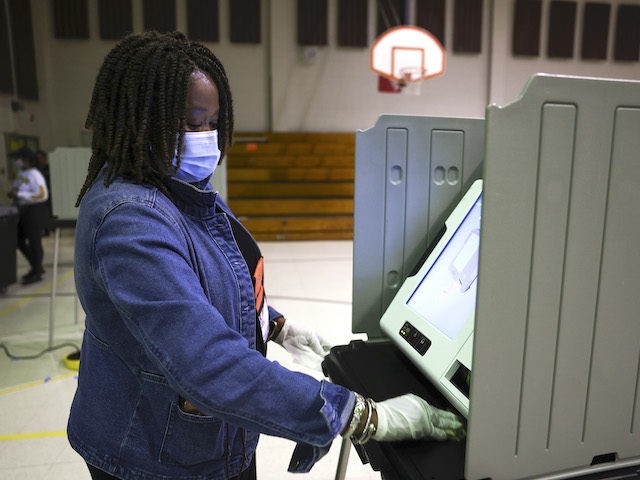Corporate leaders are targeting Republican election integrity efforts behind the scenes, hoping to shift the political dial in their favor by convincing lawmakers to reject basic election integrity laws in the future.
Corporate opposition to basic election integrity efforts came center stage following Gov. Brian Kemp (R) signing Georgia’s election integrity bill into law. Opposition came full force, as prominent leftists continued to mischaracterize the measure as suppressive and racist. The American Civil Liberties Union (ACLU), for example, falsely described Georgia’s S.B. 202 as an “illegal voter suppression law,” despite the fact it actually expanded ballot access in several ways.
Prominent Democrats have since jumped aboard, advancing the false narrative such state election integrity efforts are relics of the Jim Crow era. Senate Majority Leader Chuck Schumer (D-NY) and President Joe Biden used that language, specifically.
Following the passage of Georgia’s election law, a group of prominent black business leaders wrote a letter, urging corporations to fight back, urging them to “use their clout, money, and lobbyists to sway the debate with lawmakers.”
Many corporations have heeded to those cries. Coca-Cola and Delta spoke out against Georgia’s election law, specifically, and in April, hundreds of companies, including Starbucks, Amazon, and Netflix, signed a letter signaling their opposition to state election integrity efforts — efforts that include basic voter ID measures, which a majority of Americans support.
But now, according to CNBC, corporate leaders are embracing a different approach, taking their attacks “behind the scenes”:
Since the outcry earlier this year over the passage of Georgia’s new voting law, which critics say unfairly targets minorities, many executives and companies are now airing out their concerns in private, according to multiple people briefed on the matter. Some executives have said they are concerned that the laws could hurt their employees.
…
Some people who spoke with CNBC declined to be named in this article in a bid to avoid retribution. Others declined to be named since these efforts are in progress and details have yet to be made public.
…
One of the campaigns at the state level involves pressuring NCAA leaders to come out with a forceful response to voting laws being introduced in Texas, a person with direct knowledge of the matter said. Another features a legion of corporate attorneys responding to voting laws being crafted in Pennsylvania.
Corporate leaders are also hoping to convince lawmakers to support H.R. 1, or the “For the People Act,” which would effectively nationalize U.S. elections, stripping states of their ability to implement basic election integrity measures.
“There is some real behind the scene work to try to get corporations that decided, ‘Hey, taking on Republican leaders publicly isn’t the best tactic,’ and decided working with lobbyists behind the scenes to get rid of some of these provisions is a better path,” former NBC executive Tom Rogers said, according to CNBC, which reported that Rogers “has been in touch with executives involved in the effort.”
The behind-the-scenes efforts come as Republican legislatures continue to pass measures to secure the integrity of elections in their respective states.
Florida Gov. Ron DeSantis (R) signed an election integrity bill into law earlier this month, which implements a number of additional safeguards to protect elections from possible malfeasance. That includes limits on ballot drop boxes, bans on ballot harvesting, and enhanced voter ID requirements.
However, DeSantis was not immune to left-wing criticism, with Democrats resurrecting the false comparisons to the Jim Crow era. Democrat state Rep. Omari Hardy actually described the measure as “the revival of Jim Crow in this state whether the sponsors admit it or not.”
Recent surveys show that a majority of likely voters, including a majority of black voters, do not consider basic voter identification laws discriminatory.

COMMENTS
Please let us know if you're having issues with commenting.